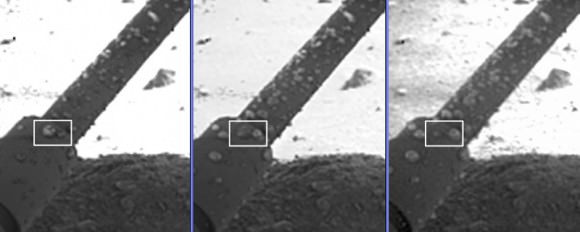http://www.universetoday.com/2009/02...ected-on-mars/
February 18th, 2009

Growing water droplets on Phoenix's legs? (NASA)
Liquid water may have been discovered by the late Phoenix Mars Lander. This astonishing (and controversial) claim comes from some very intriguing images of the lander's leg shortly after Phoenix landed on the Red Planet last year. The series of black and white images appear to show droplets of water hanging off the robot's bodywork in the shade; it seems possible that the water droplets were splashed from the surface during Phoenix's rocket-assisted landing. Far from being static blobs, they appear to grow, much like water droplets here on Earth as water vapour is absorbed from the atmosphere.
But wait a minute, isn't the Martian atmosphere too thin and too cold to accommodate liquid water? That's where the perchlorate comes inů
If liquid water has been found to exist on the surface of Mars, there will be huge implications for our understanding of the planet. Most tantalizingly, liquid water, on or near the planet's surface, could aid the survival of microbial life, reinvigorating the search for extraterrestrial life on out interplanetary neighbour. But on a planet where the atmospheric pressure is 100 times less than on Earth, and temperatures reached a maximum of -20░ Celcius during the Phoenix mission, why isn't this "liquid water" candidate frozen?
The perchlorate discovery in the Martian soil was announced by the Phoenix team in August 2008, after an explosion of intense Internet conjecture caused by the "potential for life" announcement by an Aviation Week article days earlier. It turned out that the Phoenix instrumentation had found quantities of a toxic chemical called perchlorate known to be a hindrance to life as we know it. Although follow-up reports were slightly more positive about the presence of the chemical (a possible energy source for microbial life), the mood was fairly sombre. On a planet as unforgiving as Mars, any bad news is a severe knock for the hope of finding life.
However, regardless of perchlorate's toxic effects on life, it may be helping out another one of life's resources to stay in liquid form. If perchlorate is dissolved in significant quantities, water could remain as a liquid down to temperatures as low as -70░C. So could it be that the dissolved perchlorate salt is acting as a very impressive anti-freeze?
Nilton Renno from the University of Michigan and Phoenix team member, thinks it could be. "According to my calculations, you can have liquid saline solutions just below the surface almost anywhere on Mars," he said.
Renno's team carried out a series of laboratory experiments and found that the lander's thrusters would have melted the top millimetre of ice in the regolith. The resulting water droplets may have been splashed onto the landers leg. If the concentration of perchlorate was high enough, the water could have remained in a liquid state during the Mars daytime. As time progressed, atmospheric water vapour may have been absorbed, hence the growing and shifting blobs of liquid on the leg. There is also the possibility that the droplets were splashed from pools of perchlorate-rich water already in a liquid state on the surface.
However, not everyone is convinced. Fellow Phoenix team member Michael Hecht from NASA's Jet Propulsion Laboratory in Pasadena, California, thinks that the photographs actually show water ice, not liquid water. The "frost" changed shape as vapour from the air coalesced and froze to the leg. Renno points out that this is unlikely as any ice on the leg would be more likely to sublime, rather than grow, but Hecht believes this could happen if the leg was colder than its surroundings.
Renno's team will be continuing tests on samples of perchlorate-rich water under Mars-like conditions for the next few months to understand the dynamics of water under these extreme conditions. What makes this even more interesting is that some microbial life on Earth has the ability to survive in very salty fluids, perhaps microbial alien life on Mars evolved in a similar environment where there were pools of liquid water maintained at extremely low temperatures by high concentrations of perchlorate saltů
Source: New Scientist